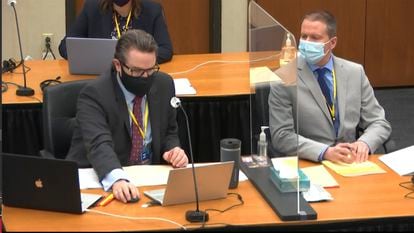Attorney Eric Nelson, left, and his client, former police officer Derek Chauvin, in Hennepin County Courthouse, Minneapolis. AP
On the seventh day of the trial against Derek Chauvin, accused of murdering George Floyd, the defense of the ex-police officer seems increasingly trapped in his argument that the ex-agent applied a “reasonable” force and responded according to what was learned during the arrest of the African American .
Police authorities who testified Tuesday reinforced the argument made Monday by the Minneapolis police chief by rejecting that the tactic of knee-nailing an unconscious and handcuffed suspect was allowed or taught to officers.
However, the argument by Chauvin's lawyers that it is difficult to focus on the detainee when there is a commotion around him grows louder.
Lieutenant Johnny Mercil, in charge of training the Minneapolis police in the use of force, clarified at trial that the "neck restraint" when the suspect is unconscious, as was the case with Floyd for several minutes, is prohibited.
"It would be an act of aggression" to apply that technique under those circumstances, said the lieutenant, currently on leave, as have a hundred officers since Floyd's death.
Mercil explained on the stand that an "appropriate time" for an officer to remove his knee from the detainee's body is when he is handcuffed and shows no resistance.
In the brutal video of the arrest of the African American on May 25, 2020, it is seen how he, handcuffed, resisted strongly only at the beginning.
Then it fades, until you lose consciousness.
Chauvin did not remove his knee from his neck even when the ambulance arrived.
The trial has seen how the paramedics who arrived at the crime scene tried to take Floyd's pulse with the former policeman still on his neck.
The question of how reasonable the use of force exerted by Chauvin was in the arrest of Floyd has been key during the first days of the second week of the trial held in the court of Hennepin County, jurisdiction in which the events occurred ( Minneapolis).
The amount of force that must be used is "the minimum necessary to achieve the objective of arresting and detaining someone," Mercil said.
Eric Nelson, Chauvin's attorney, asked the lieutenant if unconscious people can suddenly regain consciousness and defend themselves, something Mercil confirmed.
Exceptionalities
The defendant's defense has tried to reinforce, through such exceptionalities, that the behavior of the ex-police officer was justified.
Even for nine minutes and 29 seconds.
Even when the suspect was lying unconscious on the ground.
Sergeant Ker Yang, charged with educating Minneapolis police officers on how to respond to a crisis, testified that the officers who arrested Floyd were trained to assess those situations and should have gone from using force against the suspect to trying to provide care. medical.
Chauvin's defense asked him if there were times when people "don't understand that police actions can look really bad."
Yange answered affirmatively.
"But they can still be legal, even if they look bad, right?" He insisted.
The sergeant answered yes again.
Another argument from Chauvin's lawyer is the distraction caused by the dozen witnesses who witnessed the arrest.
On Monday, Minneapolis Police Chief Medaria Arradondo argued that if people don't interfere with policing, they have a constitutional right to be present and speak up.
The testimony of Nicole Mackenzie, the police department's medical instructor, strengthened Chauvin's defense.
Mackenzie stated that it is very difficult to focus on a patient when noisy events are happening around.
Also that it is more difficult to evaluate and adds the possibility of missing signs of problems.
Nelson asked Mercil if statements like "you're stupid" or "I'm going to hit you" could reasonably distract a police officer while he is working.
The lieutenant confirmed that this could happen.
Immediately afterwards, the prosecution asked him if phrases such as: "let him go, he's killing him", should also be considered by the agent.
"Potentially, yes," Mercil replied.

